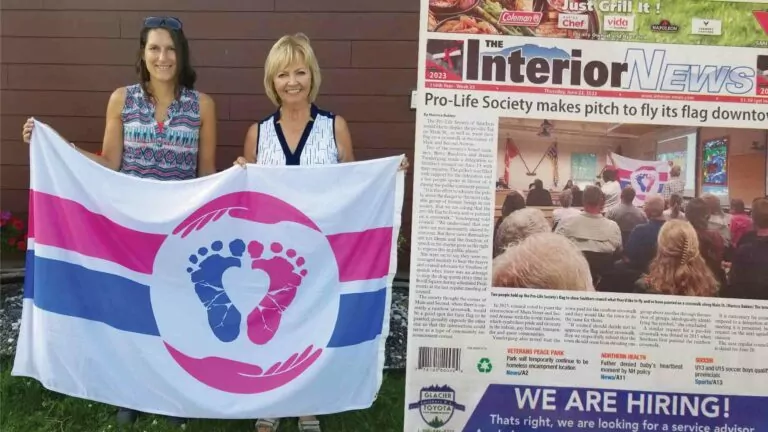A proposal by the Smithers Pro-Life Society for their community to fly a pro-life flag was unanimously rejected by their town council, but not without exposing their worldviews and getting the entire community talking about life and freedom and what to do when worldviews conflict.
An unlikely catalyst
Along with many other communities located towards BC’s west coast, the town of Smithers has embraced a very secular ideology, which it understands to be “progressive.” As a part of its recent “Pride” celebrations, the town welcomed a drag queen story reading for children at the public library.
Not impressed, over 800 members of the community signed a petition to express their concerns.
Jessica Vandergaag, a board member of Smithers Pro-Life, was in attendance when the town council responded to this petition.
“The councillors reiterated over and over how inclusive and diverse our community is and that the public square was for ‘everyone.’ Their words rang through my head all evening. A thought came to mind – why not ask for the pro-life flag now when we can hold them to their words of inclusion and diversity? While they still remember the words they said!”
Since the town flies rainbow flags on its main street, Smithers Pro-Life was planning to request next year that a pro-life flag be hung as well. But with the town council’s declaration that the public square is for everyone, now seemed the time to act.
In the same month Vandergaag, along with board member Betty Bandstra, stood before Smithers council, backed by a crowd of supporters in the gallery. They requested that the town hang the pro-life flag or paint it on a crosswalk in the same intersection as the rainbow crosswalk.
Vandergaag proceeded to give an impassioned speech to Council, explaining that “the pre-born remain the group that is most ignored, even though it has the highest death rate, 100,000 killed per year in Canada.”
After quoting the mayor’s and councillors recent comments about welcoming different perspectives and worldviews, Vandergaag had the pro-life flag held up, and she made the case that the most vulnerable deserve public recognition “because it is through the awareness of human rights abuses that empathy is developed and public opinion is changed.”
A confused response
What was the town council going to do? How could they turn down a request for a symbol that shows inclusiveness for vulnerable citizens, with so many in the community demonstrating their support? The local newspaper gave the story its front page, providing coverage that was surprisingly fair to Smithers Pro-Life.
Council put the request on their next meeting agenda, and the pro-life community showed up once again, filling the gallery to show their support for the initiative.
Each council member spoke, and their words exposed the impact this proposal had on their hearts and souls. They were emotional and passionate… and also confused.
One council member, Genevieve Patterson, who identified herself as both pro-choice and Christian, was in tears as she shared her story of multiple miscarriages. She explained how she had three pregnancies where the baby had died after the first trimester, requiring her to have a D&C procedure, to remove the baby. She went on to call the D&C her “abortion” and said that “I am grateful for my right to choose. It saved my life.” She added “As a Christian woman, and a leader in my community, I will never use my relationship with God to rationalize my political beliefs, as I believe my relationship with God is just that – my own.”
Although everyone should sympathize with her experience, it is a fallacy to compare what she went through with abortion, as an abortion involves purposeful action to end the life of a preborn child. The pro-life perspective would adamantly support her in her D&C. And although she professes to keep her faith separate from her political beliefs, her pro-choice stance made it very clear that her beliefs dictated her political beliefs.
The one member of Council who is known as a Christian and a member of a local Reformed church also voted against the flag. He explained that the feedback he read about the proposal included the concern that:
“there will be women in our town, who might have had an abortion, not because they wanted to but because life circumstances forced them to such a decision. The presence of a pro-life flag or crosswalk could be very triggering.”
He could understand why they would conclude that. His other comments made it evident that his main concern was about how people from both sides of these issues talked about the other side.
Somewhat ironically, the only Council member who showed support for the proposal explained that he was an atheist, and had opposed the original rainbow crosswalk proposal on the grounds that it would raise one ideology or group over others. He sees this current proposal as proof that he was correct, and voted against it for the same reason as the rainbow crosswalk. He said he wanted to see a new proposal to not allow the town to make any more symbolic statements like the rainbow crosswalk, though he wouldn’t remove that crosswalk now because he isn’t in favour of removing symbols.
Gladys Atrill, the town’s mayor, started her speech by reflecting that “residents of Smithers have challenged council in the past two weeks with big issues: issues about who we are, what we believe, our worldviews, what is OK in public, what symbols we should consider.”
She proceeded to contrast the rainbow flag, and its alignment with the Canadian Human Rights Act, with the pro-life flag, which contradicts the reality that abortion is legal in Canada.
“As such, I’m not in favor of placing symbols in public places that relate to health procedures since there are many that are viewed as controversial….. Miss Vandergaag linked her strong faith in God to her pro-life belief. Others hold different views, that abortion is a medically-necessary procedure and that women have the right to self-determination.”
Mayor Atrill failed to recognize that the right to life is foundational to all other rights and is included in the Canadian Charter of Rights and Freedoms, which the town is bound to uphold. She also failed to recognize that many things were legal and even celebrated in the past which we are ashamed of today (including how women were not recognized as persons under the law). The fact that something is recognized by law doesn’t make it right. To add to this, the mayor had no issue imposing her worldview (the right to abortion), over Vandergaag’s and others who are pro-life, within the same minute that she claimed that “The debate over abortion belongs at other tables than this one.”
From town hall to town square
After the town’s unanimous decision against the pro-life flag, the local media covered the story again. And this sparked a conversation that has carried on in the following weeks.
In July, a local radio station invited Vandergaag and Bandstra, along with the drag queen story hour host, to an hour-long discussion about the pro-life flag proposal. Although she was nervous about taking part, she reflected after that “the conversation went well and I really felt at the end that God gave me words and guided me through quite the monologue.” She added that the others who took part expressed thanks to her and Bandstra for the civil conversation and the councillor in particular seemed “quite moved” by it. “I really pray and believe that even if it is not aired, that God did some planting there between the six of us.”
Reflecting on the whole ordeal, she commented “while the result was not as we hoped, we do believe it to be a positive experience in the grand scheme.” She proceeded to give one example.
“I was contacted by a former co-worker, whom I had no idea was pro-life, wondering what the result from Town Council was. Her family was visiting from Ireland and it was a topic of their conversation. I shared that it had been voted down and she expressed her sadness. I was touched that she contacted me and that conversations about it were still happening over a month later!”
Not only do these conversations bring attention to our preborn neighbours, they also break through the veneer of “inclusivity” and “equality” that our secular leaders often champion, without having to defend. It was rather obvious that the council members only welcomed some perspectives, and these were ones that aligned with their own worldviews. The antithesis is as real in 2023 as it was in the Garden of Eden.
Vandergaag “absolutely recommends” others to do this in their communities, both because of the conversation it creates and as a voice for the preborn who are otherwise not heard. But she also advised that it be done as a “delegation request” rather than simply a letter request. This is a request to address town council in person about a matter that important to a citizen or group, before a decision is made. “Letters can get passed by but a delegation request gets you extra time to present your request and the town council has to act on it with a motion in the following meeting.”











